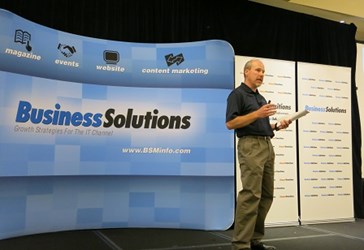Channel Transitions: The Makings Of A Great MSP Product


To successfully design managed services offerings, your products should reflect what makes you unique as a managed services provider (MSP) — your technical expertise, the capabilities you have that your competitors don’t, and vertical specializations. David Wilkeson, CEO of MSP Advisor, stressed the importance of differentiating your MSP during his keynote “Successful MSP Product Design” at Channel Transitions VAR/MSP Executive Conference, powered by Business Solutions, on November 5 at the DoubleTree Orlando Airport.
In addition to sharing insights from his experience at MSP Advisor, which provides one-on-one consulting and business coaching for MSPs of all sizes, Wilkeson also spoke from first-hand experience. From 2005 to 2013, he was the COO and partner of DRS (acquired by Involta in June). DRS began as a nine-person break-fix shop in Youngstown, OH, grew to an MSP and cloud provider with more than 85 staff members based in offices in northern Ohio and western PA and more than $20 million in sales annually.
As you build products, he advised emphasizing the outcomes the products you provide — not the products themselves. He also stressed, “Make it as difficult as you can for your competitors to compare what you have with what they can do. Avoid commoditization.”
Wilkeson says one way to differentiate your MSP is to bundle services. This not only helps avoid commoditization by making it more difficult to compare you to another MSP on price, it can also make it easier for a client to budget for your services — it shifts the cost for IT from a capital expense to a monthly operating expense. By offering solutions bundled together, you’ll also have a stickier relationship with your clients. “We had hundreds and hundreds of customers, and we lost fewer than 10. Bundling your products makes you stickier,” he commented.
Services Bundles
During his presentation, Wilkeson offered suggestions for managed services bundles:
- cloud services
- email, Hosted Exchange
- Office 365
- cloud-based backup services
- cloud-based antivirus
- cloud-based security services
- Web hosting
- connectivity
- Internet connectivity
- Office-to-office connectivity (WAN services)
- back office services
- payment solutions
- after-hours client calls
- scanning/document management services
- marketing services
- Web content management
- SEO (search engine optimization)
- social media marketing services
- training
- security training
- line of business software training
- general computer use training
- software licensing
- antivirus licensing
- accounting software licenses
- line of business software for a vertical market
- Hardware-as-a-Service
- workstations
- point of sale hardware
- networking gear
- servers
- copiers
- multifunction printers
- phone systems
Common Mistakes To Avoid
Wilkeson also warned MSPs about mistakes their peers have made when designing their products. One mistake is selling device or service monitoring as a stand-alone product, and another common mistake is bundling a white-labeled cloud service with labor and renaming it as one of your products. Wilkeson added some MSPs err by selling or bundling labor strictly based on hours. He explained that managed services is about leveraging your hourly costs times a multiple you control — not just about markup.
The biggest problem he has seen among MSPs, however, is modifying products for each of client, hampering your ability to scale your business. Wilkeson said any modification worth making should become a new product or should apply to all of your customers with that product.
Wilkeson added that it’s also important to know your costs: In addition to delineating hard costs, you need to establish a formula for calculating variable labor costs and check it regularly to make sure you are profitable.
In addition, Wilkeson advised MSPs to be aware of potential risks. “Being a managed services provider is much riskier than being a VAR. You are becoming an integrated part of your client’s organization.” He said backups are the top risk MSPs face, with other potential risks coming from malware and viruses; data loss or theft; PCI, HIPAA, or other regulatory liabilities; hardware failure; outages related to cloud services or connectivity; and upgrade labor costs.
To help mitigate risks, he advises you to establish standard, effective processes to deliver services and to have solid, fair contracts that set limits in writing. You must also educate yourself on the regulatory requirements related to the vertical markets in which you work; perform background checks on your employees; and have a good errors and omissions insurance policy.
For more information on the Channel Transitions VAR/MSP Executive Conference, visit www.ChannelTransitions.com or email Events@BSMinfo.com. For additional coverage of Channel Transitions conferences, visit http://www.bsminfo.com/solution/inside-channel-transitions.
Channel Transitions is sponsored by platinum sponsors MAXfocus, and Worldpay, gold sponsors Harbortouch and Mercury, and networking sponsors Moneris and RapidFire Tools, along with industry association partners CompTIA, The ASCII Group, and the Retail Solutions Providers Association (RSPA).
